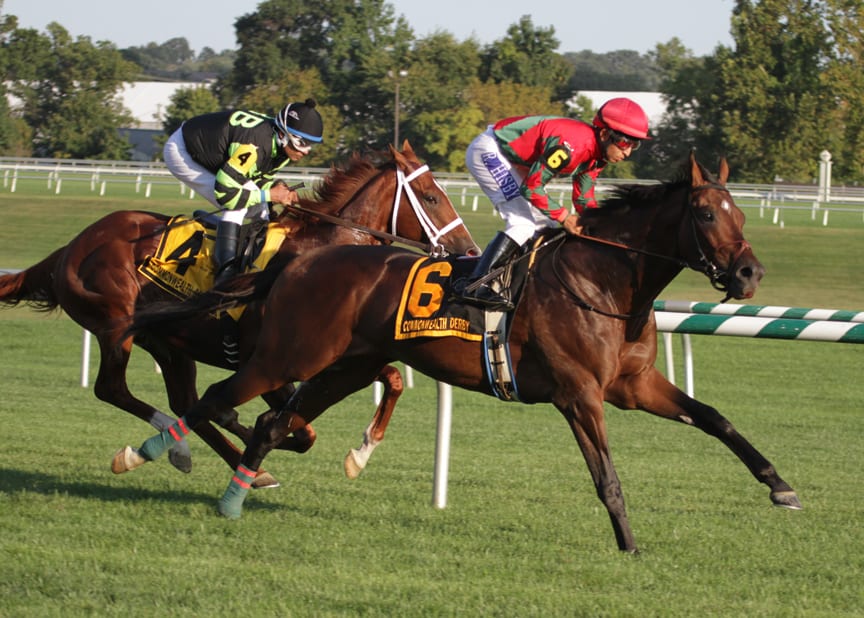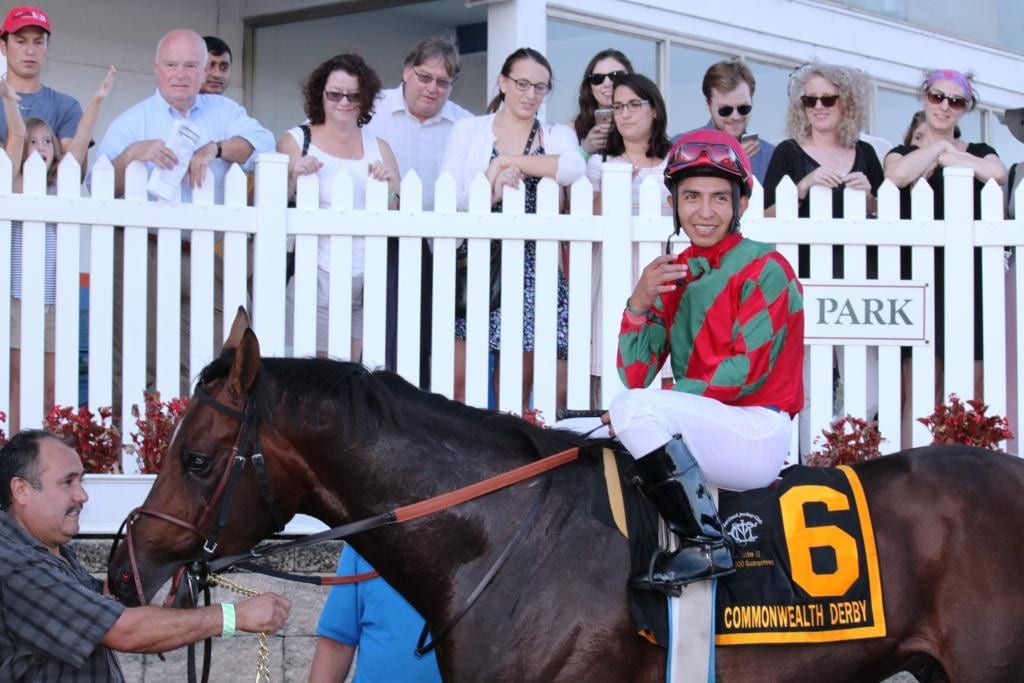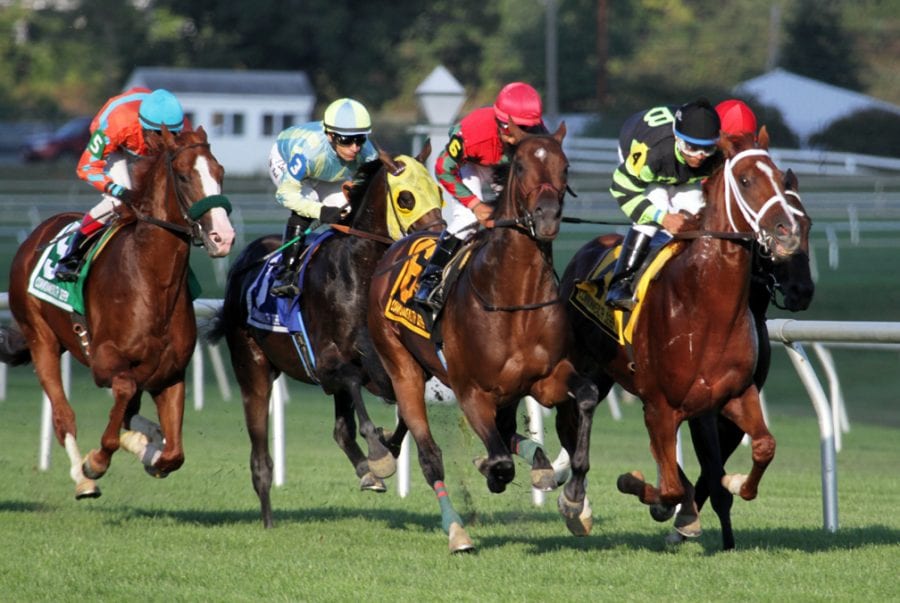
One Go All Go and Ronald Hisby cleared to an early lead en route to winning the Commonwealth Derby. Photo by Laurie Asseo.
by Nick Hahn
Saturday’s former Virginia Derby was sure to be memorable one way or another. That the “Virginia” Derby had to be run in Maryland, at Laurel Park, and under an assumed name — the Commonwealth Derby — ensured that.
When Virginia-bred 35-1 long shot One Go All Go blitzed out of the gate and couldn’t be caught, it became a zany, landmark win.
After the running of Saturday’s $400,000 Commonwealth Derby (G2), presented by the Virginia Equine Alliance, the last name of winning jockey Ronald Hisby may have echoed through the Laurel grandstand. Or it might have been confused punters asking, “Who was he?”
In only his 12th win in the United States, the jockey from Peru dashed to the lead and never looked back, with One Go All Go becoming only the second horse to wire the field in this race, the first since Lightning Paces in 2000. It was Hisby’s first stakes win in the United States. Hisby, who won five of 134 starts in 2013 and went 0 for 26 in 2014 — making it a 5-for-160 start — nearly doubled his career earnings, the Derby win worth almost what he’d earned in 247 prior starts.
Here’s a handicapping angle for future editions of this three-year-old turf stake: look for a Peruvian jockey. Hisby and countryman Edgar Prado have combined to win nearly a quarter of the starts, four of 17 overall. Prado won this race three times in a row, never as the favorite — but never as a longshot, either. Hisby, on the other hand, and One Go All Go paid $72.40 for the win.
Through an interpreter, Hisby referred to Prado as his friend and his family as “nice people.”

Ronald Hisby smiles for the cameras after winning the Commonwealth Derby. Photo by Nick Hahn.
It was a similar storyline for the Czech trainer, Pavel Matejka, who claimed the stake as just his 18th career win in the United States. Prior to saddling One Go All Go Saturday afternoon, Matejka’s highest earner, Read the Cards, had earned $37,680 lifetime. He had only arrived at Laurel Park the night prior to win what is believed to be his first ever stakes win.
So bitter has been the industry dispute in Virginia that the race couldn’t be run under its real name, the Virginia Derby. When contested at Colonial Downs, a Virginia-bred never won any of 16 editions — even though many Virginia-breds competed at high levels around the country — demonstrating a major disconnect in the objectives of where to take racing between the track operators and Virginia horsemen.
However, in the first running at Laurel, it was One Go All Go, bred by Albert Coppola at his Drumlanrig Farm in Upperville, VA, who got the money. Coppola, a University of Virginia graduate who once named a horse Virginia Cavalier, considered the win gratifying.
It was also, in a sense, a racing circle coming around.
“We’ve had this pedigree for a long time,” explained Coppola, retracing the lineage back to Runaway Groom, his father’s 1982 Traver’s Stakes winner. One Go All Go, by Fairbanks, is out of See Ashleigh Run, by Marquetry; See Ashleigh Run’s dam, Runaway Ashleigh, was a daughter of Runaway Groom.
Coppola stood on a table as a twenty-six year old and watched Runaway Groom win the 1982 Travers Stakes. Although Virginia horses have a successful history of performance at New York tracks, Runaway Groom wasn’t exactly the result of an old-school, traditional Virginia breeding approach. Coppola’s father’s entry in the racing began in 1979, and Runaway Groom was an Ontario-bred.
One Go All Go’s owners, Jack and Art Preston of Preston Farm and Prestonwood Stables, go back to when Colonial Downs raced in the fall. They owned two of the biggest horses that raced at Colonial in the early days: Da Hoss and Victory Gallop. Da Hoss prevailed over John’s Call in a legendary allowance race in the fall of 1998 at Colonial Downs, his only start between Breeders’ Cup wins in 1996 and 1998. Victory Gallop in 1997 won two races on the dirt during Colonial Downs’ inaugural season — before Colonial’s turf course was built — en route to thwarting Real Quiet’s Triple Crown the following spring.
And so, all it took for a truly Virginia horse to win the “Not the Virginia Derby” was for it to be run in Maryland (and, of course, a 35-1 upset). Speculation on the merits of running the race out of state will likely be debated by industry officials in conference calls and commission meetings for months to come as Virginia racing gets reorganized for 2016 and beyond. Safe to say, however, that Albert Coppola — and Ronald Hisby, and Pavel Matejka, and the big crowd that came out to Laurel — have already made up their minds.









SHAME ON VIRGINIA!
As I travelled back to Virginia following a day of horse racing at Laurel Park, I thought to myself, Virginia out to be ashamed! The Virginia Derby, now the Commonwealth Derby, was held in Maryland. What a disgrace!
Due to a lack of any control or authority from the Virginia Racing Commission, a group of Virginia Horsemen who still don’t have a clue, and an owner of Colonial Downs who simply won’t back down, we now have Virginia’s finest race being run in Maryland. As I witnessed a 35-1 shot cross the wire in first, I thought how much more appropriate it would have been for the race to have been run at Colonial Downs where it belongs. Two more years and I can retire to either Kentucky or Florida where horse people actually care about horse racing!!!
Agree.. so sad.